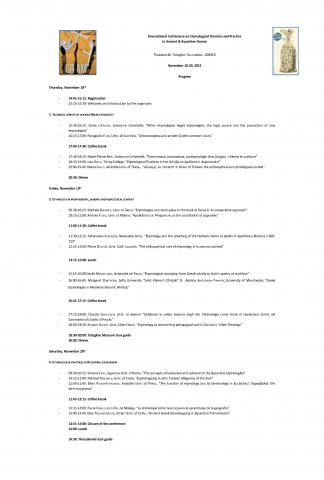2021 Conference

3rd ETYGRAM Conference in Thessaloniki, 2021, November 18-20
zucker@unice.fr Thu, 01/14/2021 - 19:14
International Conference on Etymological Theories and Practice
in Ancient & Byzantine Greece
Thessaloniki, Teloglion Foundation, GREECE
November 18-20, 2021
Program
Thursday, November 18th
- 14:45-15:15: Registration
- 15:15-15:30: Welcome and Introduction by the organizers
1. Technical aspects of ancient Greek etymology
- 15:30-16:15: Claire LeFeuvre, Sorbonne Université, “When etymologies beget etymologies: the logic square and the production of new etymologies”
- 16:15-17:00: Panagiotis Filos, Univ. of Ioannina, “Onomatopoeia and ancient Greek common nouns”
17:00-17:30: Coffee break
- 17:30-18:15: Marie-Pierre Noël, Sorbonne Université, “Paronomase, paromoiose, parétymologie chez Gorgias : théorie et pratique“
- 18:15-19:00: Lisa Doyle, Trinity College, “Etymological Practices in the Scholia on Apollonius' Argonautica”
- 19:00-19:45: Maria Chriti, Aristotle Univ. of Thess., “‘Δύναμις’ as ‘content’ in Orion of Thebes: the philosophical and philological context”
20:30: Dinner
Friday, November 19th
2. Etymology in propaedeutic, erudite and pedagogical context
- 09:30-10:15: Michele Bianconi, Univ. di Siena, “Etymologies and word-plays in the book of Genesis: A comparative approach”
10:15-11:00: Andrea Filoni, Univ. di Milano, “Apollodorus in Pergamum, or the conciliation of opposites”
11:00-11:30: Coffee break
- 11:30-12:15: Athanasios Vergados, Newcastle Univ., “Etymology and the rewriting of the Homeric Hymn to Apollo in Apollonius Rhodius 2.669-719”
- 12:15-13:00: Pierre Destrée, Univ. Cath. Louvain, “The philosophical uses of etymology in humorous context”
13:15-15:00: Lunch
- 15:15-16:00 Cecile Margelidon, Université de Tours, “Etymological wordplay: from Greek scholia to Ovid’s poetry of erudition”
- 16:00-16:45: Margaret Dimitrova, Sofia University “Saint Kliment Ohridski” & Adelina Angusheva-Tihanov, University of Manchester, “Greek Etymologies in Medieval Slavonic Writing”
16:45-17:15: Coffee break
- 17:15-18:00: Claudia Gianturco, Univ. di Salerno “Celebrare la celata essenza degli dèi: l’etimologia come fonte di rivelazione divina nel Commento al Cratilo di Proclo.”
- 18:00-18:30: Arnaud Zucker, Univ. Côte d’Azur, “Etymology as overarching pedagogical tool in Cornutus’ Greek Theology”
18:30-20:00: Teloglion Museum tour guide
20:00: Dinner
Saturday, November 20th
4. Etymological practices in Byzantine scholarship
- 09:30-10:15: Simone Fiori, Sapienza Univ. di Roma, “The concepts of barbarism and solecism in the Byzantine Etymologika”
- 10:15-11:00: Michael Paschalis, Univ. of Crete, “Etymologizing in John Tzetzes’ Allegories of the Iliad”
- 11:00-11:45: Eleni Peraki-Kyriakidou, Aristotle Univ. of Thess., “The function of etymology and its terminology in Eustathius’ Παρεκβολαί: the term συγγένεια”
11:45-12:15: Coffee break
- 12:15-13:00: Paula Caballero, Univ. de Málaga, “La etimología como recurso para el aprendizaje de la geografía”
- 13:00-13:45: Elias Tsolakopoulos, Ionian Univ. of Corfu, “Ancient Greek Etymologizing in Byzantine Transmission”
13:45-14:00: Closure of the conference
14:00: Lunch
14:30: Thessaloniki tour guide
International Conference on Etymological Theories and Practice in Ancient & Byzantine Greece
Thessaloniki, Telogleion Foundation, Greece
November 18-20, 2021
Organizers: Maria Chriti (Aristotle Univ., Greece), Claire Le Feuvre (Sorbonne Université, France), Arnaud Zucker (Univ. Côte d’Azur, France).
This international conference, to be held in Thessaloniki in November 2021 aims to attract researchers, mainly philologists, linguists and philosophers interested in ancient practices of etymologizing in Ancient Greek and Byzantine literature. It is promoted by the International Association ETYGRAM (http://www.cepam.cnrs.fr/etygram/) devoted to the study of indigenous (or “emic”) ancient Greek etymologies and follows two editions in 2016 and 2018. The ancient Greek conception of etymology is fundamentally different from our modern one and has a much broader meaning. To start with, it allows a rather exceptional plasticity (see, e.g., Plato’s Cratylus) as far as semantic paronomasia is concerned. As ancient scholars understood it, etymology is chiefly a dynamic process aiming at suggesting semantic correlations between words based on phonetic similarities, with a momentous heuristic power. This intellectual game, a very serious one at that, deserves to be investigated since it is neither scientific in character (as modern linguists would describe it), nor labellable as “folk” etymology. It is rather a cultural construction, which is both an art of punning and an attempt to uncover deep semantic motivations.
The organizers welcome proposals (in French, English, Greek, German, Spanish or Italian), taking especially into account the following parameters:
- The technical aspects of ancient Greek etymology.
- Etymology and neologisms in scientific contexts.
- Etymology in pedagogical practices.
- Etymological practices in the scholia and commentaries of Late Antiquity and Byzantium.
Program Committee : Simone Beta (Univ. Siena. Italy), Maria Chriti (Aristotle University of Thessaloniki. Greece), Christophe Cusset (ENS Lyon. France), Richard Faure (Univ. Côte d’Azur. France), Claire Le Feuvre (Sorbonne Université. France), Giorgos Papanastassiou (Aristotle University of Thessaloniki. Greece), Nathalie Rousseau (Sorbonne Université. France), Richard Seaford (University of Exeter. Great Britain), Athanasios Vergados (Newcastle University. Great Britain) Arnaud Zucker (Univ. Côte d’Azur. France).








